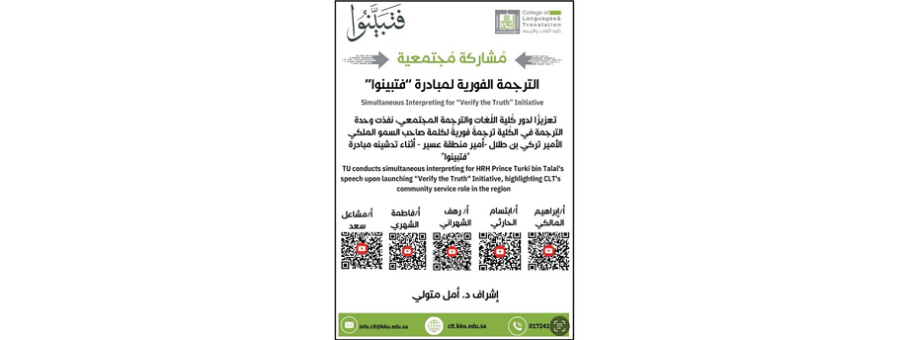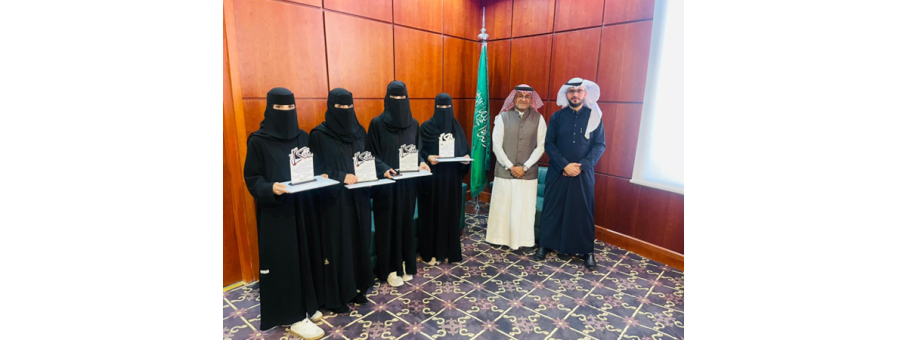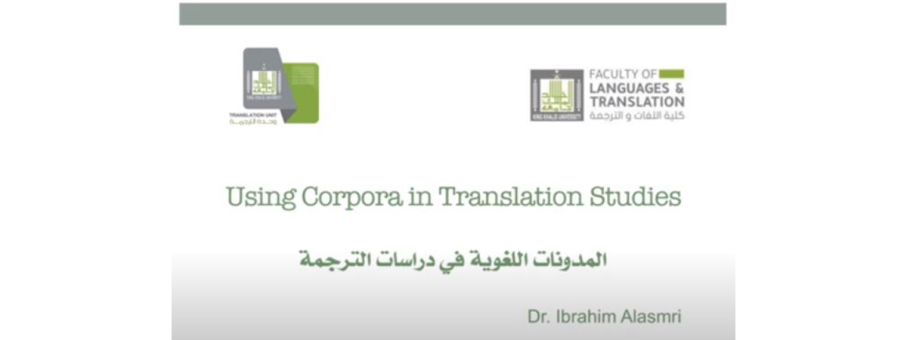Inauguration
The 12th Annual Research Day, under the supervision of Dean, Dr. Abdullah Al Melhi, and Dr. Ismail Al Refaai, Director of the Language Research Center, was held on April 20, 2017, at King Khalid University. The program began with a recitation of the Holy Quran and a welcome speech by Dr. Abdullah Al Melhi. In his speech, he emphasized the vital importance of not only participating in Research Day 2017 but also expressed that new directions of inquiry and new insights from the 12th Annual Research Day will provide a platform for all of us to discover, imagine, and create. He praised our talented faculty members for their research contributions and appreciated their creative endeavors. He also thanked the organizing committee who worked tirelessly behind the scenes to ensure the event was outstanding.
First Session
The theme of the first session was Bilingualism. The first speaker was Dr. Munassir Alhamami whose presentation was titled English and Arabic in the College of Sciences. It was based on his research that aimed at investigating the use of English as the Medium of Instruction in Saudi Science Colleges. He pinpointed many issues associated with the use of English as a Medium of Instruction. This was followed by Dr. Oveesa Farooq’s presentation titled Need of a Syntax-based Interpretation of Learning English as a Second Language among Arabic Speakers. She focused on the significance of having a working knowledge of phonology, morphology, syntax and semantics. Her research, she pointedly said, underpinned the idea that native Arabic speakers’ poor knowledge of the four skills is the result of their lack of knowledge concerning the language system.
Dr. Abdul Wahed Al Zumor, who appeared third, in his presentation titled Arabic Language Policy and Planning in Saudi Arabia, highlighted the efforts the Kingdom had been doing since 1346H. The study aimed to attract researchers’ attention to the issue of Arabic language policy and planning. He concluded that this country’s development and its language policy are in step. Dr. Hasan Jaashan’s topic was Topographical Divergences and their Impact on Linguistic Variation. His presentation was based on his study that aimed to determine the phonological features of people who live in mountain areas as opposed to those who live in the coastal regions. His conclusion was that people living in mountainous regions use more complex phonological structures than those living in coastal regions. Dr. Shadma Iffat’s presentation was titled An Overview of Students-Teachers Relationship in Colleges and its Effect on Students’ Academic Achievement. She pointed out that Teacher-Student relationships can be the key to students' attitudinal motivations that exist towards learning.
Second Session
The speakers of the second session had various presentations on the themes of Technology, Translation, and Literature. Dr. Mona Hamad talked about the Pros and Cons of Using Blackboard Collaborate for Blended Learning on Students Learning Outcomes. She identified some issues related to blended learning. She termed poor internet access as one of the factors that affect blended learning negatively. She also emphasized that Blackboard Collaborate for blended learning is convenient for learners who have problems with attending face-to-face lectures. Ms. Karima Ali Sallem spoke about The Role of Teacher in the Age of Globalization. She emphasized the concept of a globally competent teacher and his or her roles when facing complex challenges.
Mr. Samsur Rabb Khan had a presentation titled Teaching Literature in Language Classrooms: Why and How? He, while highlighting the significance of his study, mentioned the fact that research on literature in EFL is rare in Saudi Arabia. His study explored the role of literature in ELT and the potential advantages of using literature in EFL classrooms. Ms. Alvina Yousaf talked about Teaching Poetry to EFL Learners. She pointed out that involving learners in critical analysis of certain literary texts is one of the challenges teachers teaching poetry have to face. She also highlighted the importance of applying certain methods to facilitate understanding literature. Ms. Anjum Mishu’s presentation was titled The Effectiveness of Distance Acculturation for Saudi EFL Learners by Using English Literature. She related that interested language learners could go through a process of positive acculturation in the target language without having direct exposure to the real setting. She added that literature of the target language could help learners get the feel of staying in a native speaker setting via realia and authentic materials.
Third Session
The theme of the third session was Language Learning and Teaching. The first presentation was by Dr. Soheir Ghanem and Dr. Hanan El Sayeed Sanad, which was titled Developing an Edutainment Framework for Improving Vocabulary Acquisition and Motivation among Students at KKU. The purpose of their study was to explore the benefits of using edutainment as a teaching strategy for English language learning, vocabulary acquisition and enhancing motivation. They emphasized that proper learning is possible when education is incorporated with entertainment. Ms. Mannujan Mohini Sudha spoke about the application of a critical thinking approach to learning English in her presentation titled Introducing Critical Thinking Approach in the EFL Classroom. She pointed out that EFL classrooms are primarily teacher-centered which lacks learners’ autonomy. Such a situation could be handled, she added, with the help of problem-solving skills where learners have a chance to apply their critical thinking skills.
Ms. Ivy Sultana spoke about improving reading skills in her presentation titled Applying Different Skills and Strategies Effectively for Developing Reading Skills of the ESL Students at King Khalid University. She pinpointed a common misconception that reading is an easy skill to teach. This results in teachers’ tendency to apply traditional approaches when teaching reading. She emphasized that various strategies are involved in improving reading skills. Ms. Sanjida and Tanzina Halim's presentation was titled Usefulness and Learnability in Teaching Vocabulary to ESL/EFL Students. They put emphasis on the teachers’ knowledge of usefulness and learnability of vocabulary for their learners. They concluded that teaching vocabulary becomes easier if the teacher chooses what to teach. Dr. Dawood Ahmed Mahdi’s presentation was titled Relationship between Oral Communication Apprehension and Communication Competence among EFL Students. He termed lack of confidence or natural apprehension as the barrier to conversing in English among ESL or EFL learners. He suggested improving motivation through various activities and encouraging oral communication through proposed strategies. Dr. Syed Ali Shafee’s presentation was centered on course books. It was titled A Set of Language Skills Books with Cultural Appropriateness for Non-English Stream Arab Students. His presentation was primarily based on a proposal. He pointed out that Arab students need course books which are culturally appropriate so that comprehension becomes easier. He proposed that we work together to produce course books suitable for Arab Learners.
Research Day 2017, was a great success, and it gave the participants an opportunity to discuss and share their thoughts.
We would like to recognize the following organizing committee members for their efforts in this event:
- Mr. Erich Beer
- Ms. Fatemah Abdualla Amer
- Mr. Javed Ahmed
- Mr. Mahmudul Haque
- Mr. MD Adil
- Mr. MD Sirajul Islam
- Dr. Olaa Ali Alhaqan
- Mr. Salahud Din Abdul Rab
- Ms. Sara Abdulla Osaydan
- Mr. Sayed Karim
- Mr. Shahrear Talukdar
- Ms. Sharifah Abdualla Abo Abthan
- Dr. Zahraa Ahmed Misfer
Date: 4/22/2017
Source: MD Adil
Multimedia Source: MD Sirajul Islam





